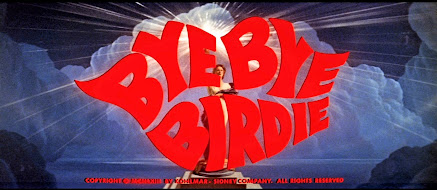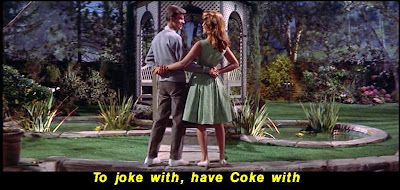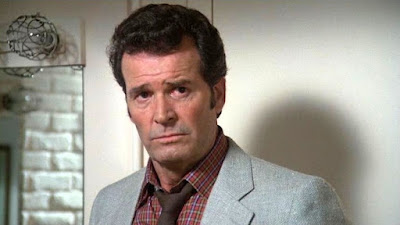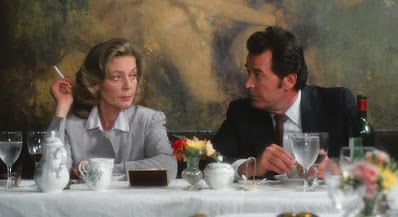When I watch a movie like Airport—producer Ross (“I gave the public what they wanted”)
Hunter’s arthritically old-fashioned, $10 million, all-star, big screen adaptation
of Arthur Hailey’s ubiquitous 1968 bestseller—I’m reminded once again why the
late '60s and '70s represent my absolute favorite era in American filmmaking.
The diversity of what was hitting the theaters was astounding. In 1970 alone we saw the release of complex films like Puzzle of a Downfall Child, Nicolas
Roeg and Donald Cammell's arty and experimental Performance, the underground
films of Andy Warhol (Trash), big-budget acts of desperation like Myra Breckinridge, documentaries (Woodstock), and the explosion in Black cinema represented by Cotton Comes to Harlem.
There were last-gasp overblown musicals (On a Clear Day You Can See Forever), the mainstream gay dramas of The Boys in the Band, sexually subversive comedies like Entertaining
Mr. Sloane and Something for Everyone, significant foreign films like Le Boucher
and The Garden of the Finzi-Continis, forgotten oddities of the Dinah East
stripe, Disney’s stuck-in-a-time-warp family films (The Boatniks), and breakout independents like John Avildsen’s Joe. And in the middle of all this, a
big, glossy, old-Hollywood gasbag melodrama in the tradition of Grand Hotel meets The V.I.Ps…all in the same year!
Looking over the list of films cited above (representing merely the tip of the
iceberg of what 1970 produced), I can scarcely get over what a broad array of
films were released. As Hollywood blindly stumbled about in a struggle to conduct business as usual while trying to keep in step with changing public tastes, we movie lovers reaped the benefit of their creative identity crisis.
Being just a kid at the time, I wasn't aware of the severe economic toll
Hollywood’s growing pains were taking on the industry. All I knew was that you
could look at the entertainment section of a newspaper (back when they could
advertise X-rated and G-rated films side by side) and find what then appeared
to be a record of the entire spectrum of human experience; all tastes and points of view represented. This broad-scope representation of life is precisely why I fell in love with
movies as a youngster, and I had no reason to believe this wasn’t how it was
always going to be.
What I'm hoping to achieve in detailing this brief and shining Camelot-esque moment in cinema history, is the granting of a kind of artistic clemency for myself. A nostalgic leniency, if you will, which begs one to take into account how, in my growing up in an atmosphere of democratic tolerance for films of all kinds, I was able to reconcile the glaring inconsistency—not to mention lapse in taste—behind my being 12-years-old and having as my absolute top, top, favorite movies at the time: Rosemary’s Baby, They Shoot Horses, Don’t They?, Midnight Cowboy, …and Airport.
 |
| Burt Lancaster as Mel Bakersfeld |
 |
| Jean Seberg as Tanya Livingston |
 |
| Dean Martin as Vernon Demerest |
 |
| Jacqueline Bisset as Gwen Meighen |
 |
| Miss Helen Hays as Ada Quonsett |
 |
| George Kennedy as Joe Patroni |
 |
| Maureen Stapleton as Inez Guerrero |
 |
| Van Heflin as D.O Guerrero |
 |
| Dana Wynter as Cindy Bakersfeld |
Nevertheless, Airport was THE film to see in 1970, and when I did, I went positively dotty over it. I thought it was one of the most exciting, action-packed, tension-filled movies I'd ever seen. During its initial run, I saw it more times than I care to remember.
I borrowed my mom's Reader's Digest "condensed" version of the novel (what was that condensed book thing all about, anyway?), then, convinced the abridged version had cut out a lot of then-sought-after smut, I checked out the complete novel from the library and re-read it. I even went out and purchased the soundtrack album...my first!...and wore it out (don't get me started on how off the geek-Richter-scale it is for a 12-year-old's first LP purchase to be Alfred Newman's by-turns spectacularly overcaffeinated /easy listening score for Airport). More frightening still, I played Airport with my toy model of a 747 Delta Airlines passenger jet, reenacting the pivotal disaster by cramming a firecracker into a hole I'd plastic model and lighting it. (Yikes! Let's hear it for the unsupervised play risks of my generation!)
What's clearer to me today, as I marvel at the way young movie audiences go ga-ga over things that are simply retreads of retreads, is that what adults in 1970 knew to be lame and hackneyed in Airport was brand new to me.
What's clearer to me today, as I marvel at the way young movie audiences go ga-ga over things that are simply retreads of retreads, is that what adults in 1970 knew to be lame and hackneyed in Airport was brand new to me.
I'm not going to say Airport isn't still one of my favorite films, for I watch it often. But I must confess that my enjoyment of it these days is strictly on par with why I repeatedly watch Valley of the Dolls, or The Oscar; which is to say, I can never get my fill when it comes to overripe Hollywood cheese.
Airport was a huge boxoffice hit and even garnered a whopping 10 Academy Award nominations. But honestly, watching it today, I don't think there are even five consecutive minutes of Airport that don't reduce me to paroxysms of laughter. And try as I might to access the me who once watched this movie unironically, I swear, it feels as though I'm hijacking someone else's memories
WHAT I LOVE ABOUT THIS FILM
I’ve seen Airport far too many times to be able to ascertain whether or not it still holds up as a viable suspense melodrama. But I can attest to it being a near non-stop parade of ugly, stiff-looking fashions culled from acres of drab polyblend synthetics; static, rigidly blocked scenes (the camera must have been nailed to the floor) with actors giving TV movie-level performances, and truly terrible dialogue. For example, old-school he-man Joe Patroni still refers to women as “broads” and “dames.” And while preferable to today’s infatuation with the word “bitch,” I kinda thought that in the '70s atmosphere of Diary of a Mad Housewife, terms like broad and dame—the Rat Pack notwithstanding—had gone out with Guys and Dolls. Also, another thing that places Airport squarely in another time and place is, in stark contrast to today’s films, Airport displays a rather quaint interest in the lives of the middle-aged. The median age of the all-star cast reads like an AAR celebrity roster.
Airport bears all the earmarks of the kind of traditional studio-system production Hollywood has been turning out for decades. Within a few short years, Airprt most definitely would have been earmarked as a TV movie, but in the transformative era of the early '70s, the movie industry thought--not incorrectly, at least for a time--that this sort of inoffensively wholesome "family" entertainment (you know, adultery, terrorism, adorable stowaways) could serve as counter-programming. The alternative for those moviegoers who still preferred their movies to be images of a world that never was, not a reflection of what it is.
As the film that more or less kicked off the '70s “disaster film” craze, and the first and least cartoonish of the four airport-themed
films in Universal’s franchise, Airport
looks, by way of comparison to the atrocities that followed, much better than
it actually is. Its plot: seven, count ‘em, seven romantic and dramatic entanglements
duke it out over a seven-hour period at a busy Midwestern airport plagued by
blizzards, airport noise bellyachers, and bombers.
At Lincoln International Airport, sexual tension and impending
disaster are co-pilots, infidelity (real and the “lusting in my
heart” variety) is virtually a job requirement, and when it comes to the way Lincoln International prioritizes customer service, mere personal tragedy and marital discord have to take a seat in coach class. In fact, the heavy doses of "The customer is always right" and "Service with a smile" airline propaganda in this movie are the things that date Airport the most.
I’ve seen Airport far too many times to be able to ascertain whether or not it still holds up as a viable suspense melodrama. But I can attest to it being a near non-stop parade of ugly, stiff-looking fashions culled from acres of drab polyblend synthetics; static, rigidly blocked scenes (the camera must have been nailed to the floor) with actors giving TV movie-level performances, and truly terrible dialogue. For example, old-school he-man Joe Patroni still refers to women as “broads” and “dames.” And while preferable to today’s infatuation with the word “bitch,” I kinda thought that in the '70s atmosphere of Diary of a Mad Housewife, terms like broad and dame—the Rat Pack notwithstanding—had gone out with Guys and Dolls. Also, another thing that places Airport squarely in another time and place is, in stark contrast to today’s films, Airport displays a rather quaint interest in the lives of the middle-aged. The median age of the all-star cast reads like an AAR celebrity roster.
 |
| Actress Virginia Grey (Ross Hunter's "lucky charm") is cast as mom to Lou Wagner, playing her wisenheimer teenage son. That's actor Dick Weston as her skeptical-looking husband |
Airport bears all the earmarks of the kind of traditional studio-system production Hollywood has been turning out for decades. Within a few short years, Airprt most definitely would have been earmarked as a TV movie, but in the transformative era of the early '70s, the movie industry thought--not incorrectly, at least for a time--that this sort of inoffensively wholesome "family" entertainment (you know, adultery, terrorism, adorable stowaways) could serve as counter-programming. The alternative for those moviegoers who still preferred their movies to be images of a world that never was, not a reflection of what it is.
Director/screenwriter George Seaton (Miracle on 34th Street, Teacher's Pet) genuinely fashions a pretty solid (and silly) entertainment from this faithful adaptation of Hailey's exhaustively researched novel, the laughs arising chiefly out of the drop-dead serious manner in which all this nonsense is delivered.
 |
| Lloyd Nolan as Head of US Customs, Harry Standish, waxes philosophically on the art of fraud detection: "First I look in their eyes...then the luggage." Kill me now. |
PERFORMANCES
Not counting her dubbed walk-on as Miss Goodthighs in Casino Royale (1967), Airport was my first Jacqueline Bisset movie. And along with being bowled over by her beauty and "Pip pip, cheerio!" British accent, I remember being quite taken with the strength of her character. Gwen Meighen is no Ellen Ripley (Alien), but she was as close as one got to a liberated heroine in those days. Not only does she decide for herself what to do about her unplanned pregnancy, but she's so fearless and take-charge under pressure.
This movie may have been made by a bunch of old men, but they were light years ahead of the curve in giving us a female character who "acts" in the face of danger, rather than shrieks and collapses into hysterics. Universal contract player Katherine Ross was the original choice for the role and was subsequently put on suspension for turning it down (this she turns down, and says yes to The Swarm?). Bisset, having earlier stepped into the Mia Farrow role in Frank Sinatra's The Detective at the last minute, was used to being second-string.
While Bisset continues to dominate the film for me (she's practically the baby in the cast), over the years I've come to grow ever fonder of the laid-back performance of Dean Martin. His popular variety show was still on the air when Airport came out, but I honestly didn't care for him much as a kid. These days I rank him as my all-time favorite male vocalist (my iPod is overflowing with his mellow crooning) and his screen appearances, which I once dismissed as being so casual as to be lazy, have actually aged rather well; coming across as appealingly natural and underplayed compared to the stiff formality of actors like Burt Lancaster.
In a film of questionable performances, it's odd that Helen Hayes' (sorry, Miss Helen Hayes') Oscar-winning turn as Ada Quonsett (described in the movie's trailer as "The mind-boggling, huggable perpetual stowaway!" ) is the one character I can barely abide (Kennedy's Joe Patroni runs a close second). Afflicted with a terminal case of the cutes and employing every little old lady cliche devised since the beginning of time, Hayes' is a hammy, vaudeville turn more in tune with a knee-slapping episode of The Andy Griffith Show than a major motion picture. But it's the kind of performance that wins Oscars (see: Margaret Rutherford in 1963's The V.I.Ps). While I like her very much in her scenes with Bisset (she gets slapped, after all), I really wouldn't have minded too much had her character been one of the bomber's casualties. Oh, and in addition, I have to race for the mute button every time she appears onscreen accompanied by her cutesy, cartoon-appropriate theme music. Both Shirley Booth and Claudette Colbert were originally considered for the role but spared themselves the schtick.
 |
| OK, the look she's giving this self-medicating nun (character actress Mary Jackson) is pretty hilarious. |
Perhaps this reveals me to be the terrible person I suspect I actually am, but next to Bisset's Gwen Meighan (the character names in this movie just scream "pulp fiction!"), my favorite character in Airport is actually Dana Wynter as Mel's fed-up, socialite wife, Cindy. Even if it's only for the reason that she is so unrelentingly one-note (that note would be: perpetually pissed off) that she's an absolute hoot.
Not only does she begin every conversation at full-throttle harpy, but here's a woman who braves the city's worst blizzard in 30 years (in mink, yet!) just to rip her husband a new asshole. She really should have been running that airport.
THE STUFF OF FANTASY
The passing of time and post-9/11 changes in airline travel have contributed to Airport acquiring a layer of historical entertainment value it didn't have in 1970. Given that Airport has about the same fantasy-to-reality ratio of any glamorous Ross Hunter production, it's doubtful that the commercial airline experience was ever as stylish as presented here. But seeing as the screenplay follows Arthur Hailey's dedication to airline operation accuracy to an almost Dragnet-degree of tedious factoid minutia, I think it gives a fairly close approximation of flying in the days when one could effortlessly sneak in and off of planes carrying homemade bombs and boarding passes in lieu of tickets.
 |
| Wives don't fare too well in Airport. Perry Mason's Barbara Hale plays Sarah Demerest, the good-natured, long-suffering wife of philandering pilot Dean Martin, and sister to Burt Lancaster. |
THE STUFF OF FANTASY
The passing of time and post-9/11 changes in airline travel have contributed to Airport acquiring a layer of historical entertainment value it didn't have in 1970. Given that Airport has about the same fantasy-to-reality ratio of any glamorous Ross Hunter production, it's doubtful that the commercial airline experience was ever as stylish as presented here. But seeing as the screenplay follows Arthur Hailey's dedication to airline operation accuracy to an almost Dragnet-degree of tedious factoid minutia, I think it gives a fairly close approximation of flying in the days when one could effortlessly sneak in and off of planes carrying homemade bombs and boarding passes in lieu of tickets.
THE STUFF OF DREAMS
In all likelihood, my fascination with Airport was at least in part due to my taking my very first plane trip just a year before, in 1969. It was a flight from California to Maryland to visit my grandmother. I don't recall much about the flight itself other than the in-flight movie was Buona Sera, Mrs. Campbell, the whole experience was thrilling, and the stewardess gave me a tiny pair of wings to pin to my sweater. I was also given this booklet of color-and-tear postcards which I've somehow managed to hold onto for all these years.
In trying to figure out what it was about Airport that so captured my imagination back in 1970, I think perhaps it's because, among the many scaled-down, low-budget, character-based films rooted in realism that came out in the late '60s and '70s, Airport, in all it's old-fashioned glory, represented something startlingly different. Too young to be familiar with all the cliches and overworked plot devices, Airport was my first real all-star Hollywood blockbuster, and perhaps, like Ross Hunter himself, I was just hungry for a taste of old-fashioned, escapist glamour. And while I wouldn't want a steady diet of it, when in the right mood and proper frame of mind, a bit of harmless fluff like Airport can be very, very satisfying.
THE AUTOGRAPH FILES
This autographed of Barry Nelson was acquired at the stage door of San Francisco's Orpheum Theater in 1977 when he was co-starring with Liza Minnelli in the pre-Broadway tour of the musical, The Act (then titled Shine It On). A very genial guy, if perhaps an unlikely musical comedy leading man.
In all likelihood, my fascination with Airport was at least in part due to my taking my very first plane trip just a year before, in 1969. It was a flight from California to Maryland to visit my grandmother. I don't recall much about the flight itself other than the in-flight movie was Buona Sera, Mrs. Campbell, the whole experience was thrilling, and the stewardess gave me a tiny pair of wings to pin to my sweater. I was also given this booklet of color-and-tear postcards which I've somehow managed to hold onto for all these years.
In trying to figure out what it was about Airport that so captured my imagination back in 1970, I think perhaps it's because, among the many scaled-down, low-budget, character-based films rooted in realism that came out in the late '60s and '70s, Airport, in all it's old-fashioned glory, represented something startlingly different. Too young to be familiar with all the cliches and overworked plot devices, Airport was my first real all-star Hollywood blockbuster, and perhaps, like Ross Hunter himself, I was just hungry for a taste of old-fashioned, escapist glamour. And while I wouldn't want a steady diet of it, when in the right mood and proper frame of mind, a bit of harmless fluff like Airport can be very, very satisfying.
Clip from "Airport"
THE AUTOGRAPH FILES
This autographed of Barry Nelson was acquired at the stage door of San Francisco's Orpheum Theater in 1977 when he was co-starring with Liza Minnelli in the pre-Broadway tour of the musical, The Act (then titled Shine It On). A very genial guy, if perhaps an unlikely musical comedy leading man.
BONUS MATERIAL
An in-depth, lavishly illustrated article about Edith Head and the costume designs (and hairstyles, aka wigs) in Airport can be found at one of my favorite movie blogs, Poseidon's Underworld






































.JPG)















.JPG)












